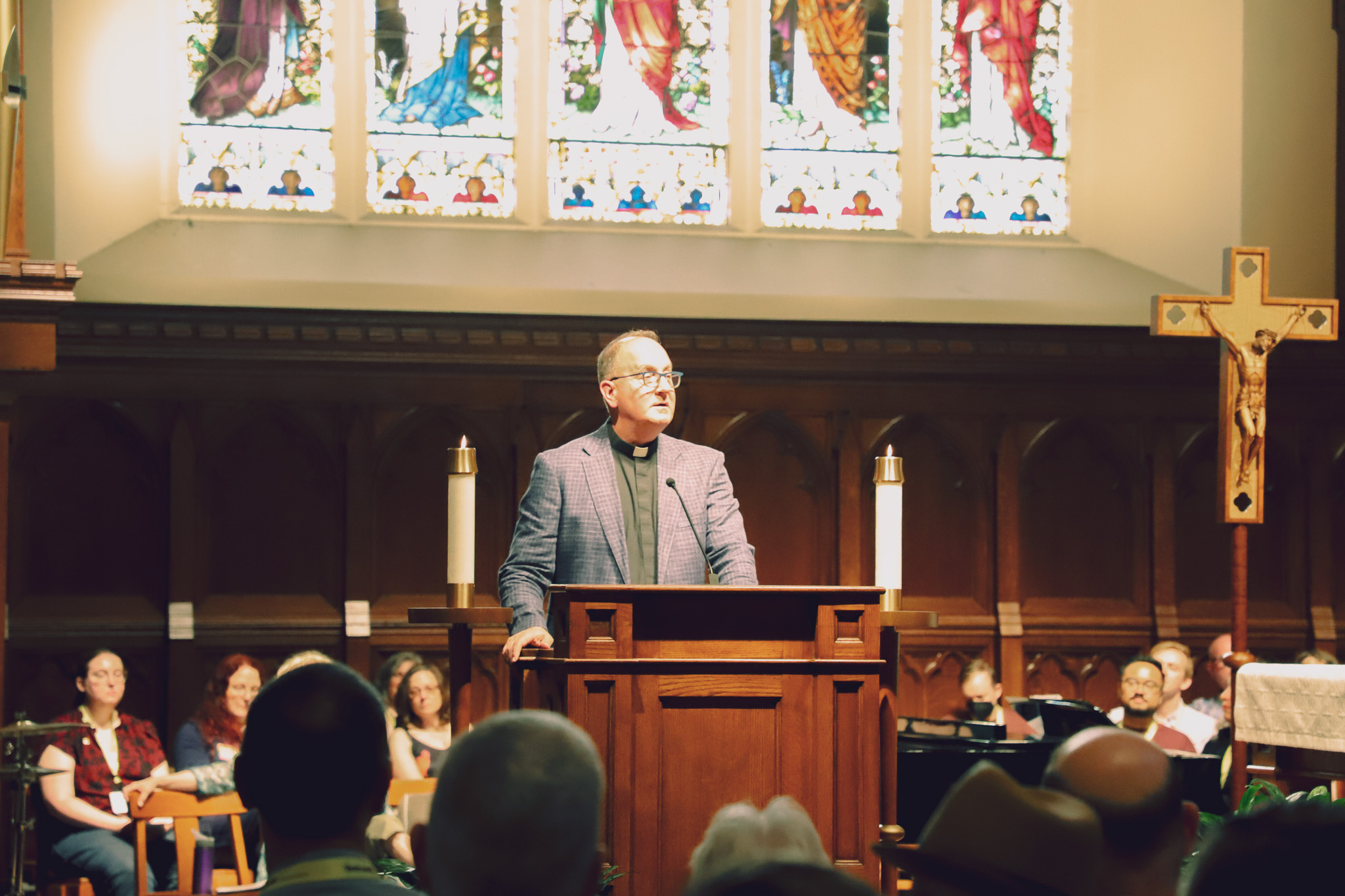Editors’ note: The following essay is the text of a keynote address delivered by Mark Bosco, S.J., at Georgetown University’s Dahlgren Chapel during the Outreach conference on August 2, 2024. It has been edited for style, clarity and length.
I would like to offer some thoughts that come from my ministry as a priest, a theologian and a literature professor these many years. I have often reflected on the paradox of the spiritual journey of LGBTQ Catholics who grow up in the faith, in which they have experienced the love and wonder of God in the sacraments and in prayer, and yet must always sift through the layers and layers of a tradition that at best marginalizes them, and at worst, condemns them.
They have grown up hearing—if not from Catholics, then certainly from fundamentalist Christians—that they are abnormal, that the Bible condemns them, that same-sex relationships are not able to reflect God’s creative intent, that they are sinners.
If gay and lesbian folks are still with us today in the church, celebrating with us, they have probably had to mature faster than most.
If gay and lesbian folks are still with us today in the church, celebrating with us, they have probably had to mature faster than most, feeling displaced at an early age and thus needing to pursue an intellectual and spiritual journey into how they fit into the Catholic fold. They have had to grapple with biblical criticism and conservative Christianity’s claims that just six out of 31,102 verses in Scripture seem to point at them. Six out of over 31,000 verses.
They have had to come to understand that those texts are usually taken out of context anyway, texts that most probably address customs of the Ancient Near East, customs that used same-sex violence as a means to humiliate a conquered foe or as a performance to violate male honor as a punishment.
LGBTQ Catholics have had to struggle to understand St. Paul’s admonitions in the New Testament about sexual deviancy, and then being surprised to learn that this admonishment seems to point to “pederasty,” a certain kind of sexual exploitation of young men by older men that St. Paul saw in Greek and Roman culture.
In sum, gay and lesbian Catholics have always had to wrestle with these texts of Scripture and the teachings of the church, in light of their own lived experiences as being drawn to the sacramental life of the church, beautifully and wonderfully made, and yet outside the fold on the margins of the church, if even that.
For the LGBTQ community, having to live in this paradox—of being born into the Body of Christ in baptism, experiencing God’s grace, yet all the while being told that you don’t quite fit, feeling that you are not quite valued—this paradox, I suggest, is a form of spiritual suffering. But as followers of Jesus, we all know that suffering is part of the spiritual path to love, the spiritual path to God’s fullness and redemption.
Gay and lesbian Catholics have always had to wrestle with these texts of Scripture and the teachings of the church in light of their own lived experiences.
Suffering is not pursued for its own sake, certainly, but it is often thrust upon us, as it was thrust upon Christ. And if our suffering is Christlike, it will be holy. It will be redemptive. But living in this paradox is not the same as living a contradiction. Contradiction means it must be one or the other. it is an either/or experience, an either/or judgment, a zero-sum game. Paradox, on the other hand, is a both/and experience, a living into the creative contraries of your life with God.
Jesus certainly lived in this paradox, as the one person who is both fully human and fully divine, the Christ who is both vulnerable hanging on the cross, and yet empowered, for he is embraced by his Father in the resurrection.
And the point is this: Our lives are meant to be a paradox. We put the paradoxes of our existence, of our identities, into a holy, creative relationship with one another and with God. We are a mystery to be lived and not mastered—for don’t we proclaim this paradox at each Eucharist, losing ourselves in this sacrifice of love in order to find ourselves embraced in that love?
Temples of the Holy Ghost
Finally, this sense of paradox and mystery at the heart of our humanity was made most real to me early in my life not by theology per se, but by the Catholic American author, Flannery O’Connor.
If you will bear with me, I want to say a few words about one of her short stories “A Temple of the Holy Ghost,” which has an intersex character at the center of the action called “the Hermaphodite,” a term commonly used in the 20th century but outdated today. I bet most of you have read at least one O’Connor story, if not in a college lit class, then certainly in an English class in high school.
Often her stories are filled with grace-filled moments brought on by some violence that shakes up a character—and shakes up the reader, too. O’Connor had the uncanny ability to synthesize a Catholic vision of reality—based on her love of St. Thomas Aquinas and the teachings of the church—with her awareness of modernist thinkers and theologians grappling with what it meant to be human in a postmodern world. Her art is “counter, original, spare, strange,” to borrow a phrase from Gerard Manley Hopkins’s poem “Pied Beauty.”
Queer Catholics will feel both displaced by their difference yet intuit that this difference just might lead them to carve out deeper hearts of compassion.
She could render in revelatory ways positive doctrines of Catholic faith and culture, and yet offered it in innovative ways that responded to the spiritual and cultural experiences of contemporary society. She places her art, her craft, at the service of an orthodox Christian faith often at odds with a complacent and compromising American culture, and a triumphal, self-satisfied, mid-century Catholic culture.
In the story “A Temple of the Holy Ghost,” O’Connor anchors the human-divine encounter in bodies: sexual bodies, martyred bodies, sacramental bodies. O’Connor builds all the disparate threads of the story to a moment of revelation in which the Body of Christ—the consecrated host of eucharistic adoration—becomes the transcendent reality that, paradoxically, holds together the secular body of a hermaphrodite and the bodies of these young girls as dwelling places of God.
The unnamed 12-year-old protagonist, naïve about sexuality, must help her mother host her two 14-year-old cousins from Mount St. Scholastica Convent School for the weekend. The older girls call themselves “Temple One” and “Temple Two,” mocking their teacher, Sr. Perpetua, who had told them what to do in the face of ungentlemanly behavior of the boys. “Stop Sir, I am a temple of the Holy Ghost.”
From the very beginning of the story, there is this transgressive comedy on the theological anthropology of the human person—made in the image and likeness of God—and at the same time the sexual awakening of the teenage girls. The reader laughs at the sharp-witted child as she pokes fun at her older cousins and attempts to put together the many dissociated facts that she has accumulated that day. With her cousins at the town fair, she is reminded of the grotesque bodies on the circus tent advertisements—what was then called “the freak show” at the fair.
Thinking that the “freaks” looked like the pained bodies of the martyrs of the early church, the young girl ruminates on her future career. She moves from wanting to be a doctor to an engineer to a saint and settles on a comical reverie of martyrdom as the only option for her proud and ornery disposition. The story dances around this notion of vocation, of the consequences of being called a temple of the Holy Ghost.
It is, I think, O’Connor’s most daring analogy, revealing in a striking way something about the nature of God and of human life that the reader has not seen before.
When her cousins arrive home from the fair and report to the young girl that they saw a hermaphrodite who told them they were not to laugh, the 12-year-old is left wondering how the intersex person could be a man and a woman both. Unable to fathom this, the young girl drifts into sleep, merging in her imagination the circus tent at the fair with that of a Protestant tent revival, and the “freak” that she has just heard about becomes “a temple of the Holy Ghost” preaching a sermon about the holiness of the body and the ruin that comes from desecrating it.
The story comes to a head in the final scene of Benediction at the convent school. The young girl’s mechanical prayers halt, and she realizes she is “in the presence of God,” and something unimaginable clicks in her thoughts as she sees the priest raise the monstrance with the Host shining ivory-colored like the sun.
Seeing the monstrance lifted, she immediately thinks of the Hermaphrodite at the fair and of her dream the night before, where the intersex person was preaching: “Raise yourself up. You are a temple of the Holy Ghost. God made me this away and I don’t dispute it. This is the way he wanted me to be.”
The Eucharist becomes the mysterious place in which two dissimilar realities are held together, a paradox that is wonderfully transgressive and at the same time absolutely orthodox. And what is this paradox?
The strangeness of the Incarnation of Christ’s dual nature as divine and human is found in the strangeness of the dualities of intersex biology. O’Connor juxtaposes the Hermaphrodite’s suffering of indignities to the incarnate Christ suffering on the Cross and made present in the sacramental bread as the broken body of Christ in the Eucharist.
It is, I think, O’Connor’s most daring analogy, revealing in a striking way something about the nature of God and of human life that the reader has not seen before. Indeed, the story suggests that God is to be found enfleshed in what is counter, strange, original, spare, enfleshed in those marginalized or alienated from society.
LGBTQ Catholics and the “deeper heart of compassion”
Which brings me to a final coda, on the church. Every LGTBQ Catholic that I have ever met or ministered to lives with a certain humility in the church, aware that the need for God’s grace must order their lives even if the church has either no interest or no means at the present time to celebrate them.
God hears you and God sees you, for we worship a God who holds all these paradoxes together in his love.
Indeed, I think LGTBQ Catholics have to put up with holier-than-thou sets of folks who contend, with a bit of self-righteousness, that the doctrines of the church cancel out the lived experience of faithful, loving people.
But the paradox? Queer Catholics will feel both displaced by their difference yet intuit that this difference just might lead them to carve out deeper hearts of compassion, sacrifice and a love that turns the other cheek. They will paradoxically feel the eyes of the faithful upon them and, at the same time, the liberating love of God and the Good News of Jesus, his beloved Son.
So, it is my hope that during Outreach 2024 we all might enter into this holy paradox, this holy mystery. Let us take note of the holy paradox of each of our journeys toward God, and especially, the holy and sometimes painful journeys of our LGTBQ Catholic sisters and brothers. God hears you and God sees you, for we worship a God who holds all these paradoxes together in his love.




